After deciding to issue NFTs, Trump began to spend time studying cryptocurrency.
By Olga Kharif, Stephanie Lai, David Pan, and Teresa Xie, Bloomberg
Translated by Luffy, Foresight News
What was supposed to be a cryptocurrency conference could easily be mistaken for a political rally for Trump.
At an event where vendors were selling red hats with the words "Make Bitcoin Great Again," the crowd erupted into enthusiastic applause as Donald Trump vowed to dismiss Gary Gensler, the chairman of the U.S. Securities and Exchange Commission, and appoint a regulator who is passionate about the cryptocurrency industry once he returns to the White House.
During the Bitcoin 2024 conference in Nashville on Saturday, Trump stated, "I assure the Bitcoin community that on the day I am sworn in, Joe Biden and Kamala Harris's anti-cryptocurrency movement will end." Trump likened cryptocurrency to the steel industry a century ago, adding, "If Bitcoin is going to the moon, I want America to lead the way."
This speech marked a complete turnaround in the former president's stance on cryptocurrency. During his tenure, he believed that cryptocurrency was a rampant criminal scam. It also marked an outsider to the political machine and financial movement, making efforts to enter the mainstream.
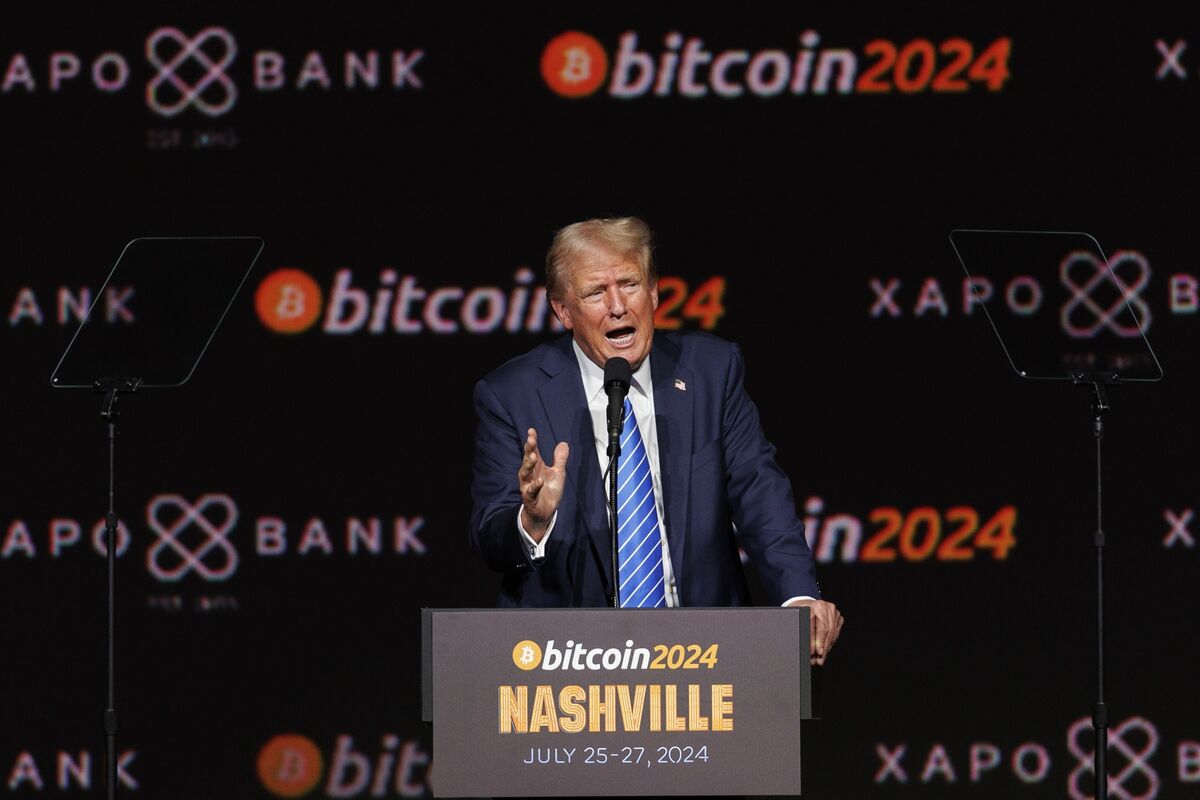
On July 27, Donald Trump spoke at the Bitcoin 2024 conference in Nashville. Trump was once a critic of cryptocurrency, but his attitude has changed since he started selling NFTs. Photographer: Brett Carlsen/Bloomberg
The traditional view is that this is just typical Trump-style transactional relationships. In the presidential election, he needs votes and money, and now it seems to be a evenly matched contest. Trump is courting a group that has been alienated by the Biden administration's crackdown on the cryptocurrency industry.
If so, he has succeeded. The public image of the cryptocurrency ecosystem has been dominated by well-funded cyber warriors who have provided Trump with tens of millions of dollars in campaign funds and an increasingly loyal fan base. Trump has gained support from Dogecoin enthusiast Elon Musk, billionaire Winklevoss brothers, and venture capitalists Marc Andreessen and Ben Horowitz.
However, despite gaining support from the cryptocurrency industry, other factors have played an important role in Trump's transformation into a cryptocurrency believer. He has fallen in love with NFTs themed around himself and the supporters who purchase these tokens. Trump has always been skeptical of the valuation of crypto assets, but this did not affect his sale and promotion of his NFTs. This was evident in May of this year when he improvised at a supporter gathering at Mar-a-Lago, where these supporters purchased at least 47 digital trading cards—pop art images of the former president dressed as a cowboy, superhero, and other characters. They were priced at $99 each.
Recently, Trump himself has criticized cryptocurrency promoters for talking nonsense and accused Bitcoin and other cryptocurrencies of fostering crime. During his presidency, he believed that the value of cryptocurrency was "coming out of thin air." However, at the time when Trump and his wife started selling NFTs, he had already changed his mind.
"Trump's NFTs did indeed put him in front of the cryptocurrency community for the first time," said Kristin Smith, CEO of the Blockchain Association, an industry trade group that has been a liaison between the Trump campaign team and the cryptocurrency industry.
For an industry plagued by scandals and facing existential threats under heavy legal actions by the government, Trump's vacillation on cryptocurrency issues may have made him a superhero in the world of NFTs. For Trump, this issue has given him another wedge issue to attack his Democratic opponents—given the enthusiasm of the crypto industry for campaigning and unprecedented fundraising amounts, this is an unbalanced wedge. The Fairshake PAC and two allied super PACs supporting cryptocurrency have raised $170 million this round, despite their commitment to focus on congressional campaigns and donate to both parties.
The symbiotic relationship between Trump and the cryptocurrency industry was evident in Nashville: as cryptocurrency fans cheered for a more friendly regulatory outlook, they contributed large sums of money to Trump. At the cryptocurrency "roundtable" he participated in, a seat cost $844,600, a photo with him cost $60,000 per person, and $100,000 per couple. On Monday, Mike Belshe, CEO of cryptocurrency company BitGo, will host a fundraising event in Palo Alto, California to raise more funds.
Although almost all the celebrities in the cryptocurrency world have some dealings with Trump, there are still some lesser-known figures who cannot be ignored, as they have been the guides for Trump's entry into the strange rabbit hole of crypto assets. The first is Bill Zanker, the founder of the adult education company The Learning Annex and one of the authors of the 2007 book "Think Big and Kick Ass with Trump." Zanker said he is an old friend of Trump's and had invited Trump to speak at The Learning Annex.
In an interview, Zanker said that about two and a half years ago, he contacted Trump to pitch an idea: NFT artworks themed around the former president's cartoons. Zanker recalled that Trump was very interested but did not want to call them NFTs. "I want to call them digital trading cards on the computer," Zanker said Trump told him. "If you call them NFTs, people won't understand at all." Later, SBF's FTX exchange collapsed, and a series of bankruptcies in 2022 led to the severe crackdown on the crypto industry by the Biden administration. In the "cryptocurrency winter" of December 2022, Zanker came to Mar-a-Lago and asked, "Mr. President, do you still want to continue?" He said, "Bill, you know, many of my friends say I shouldn't do this. But I like it, so let's do it."
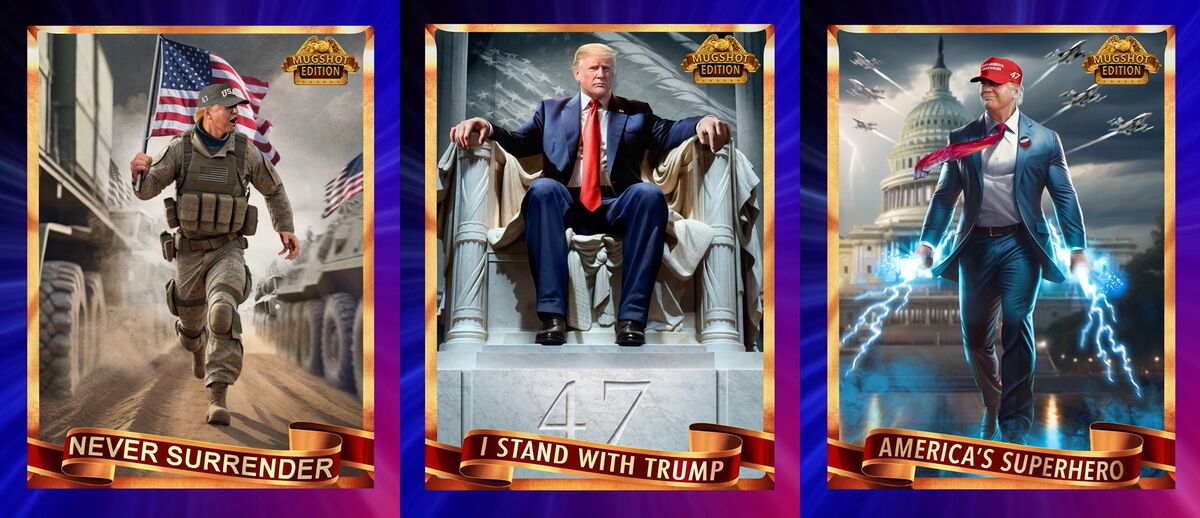
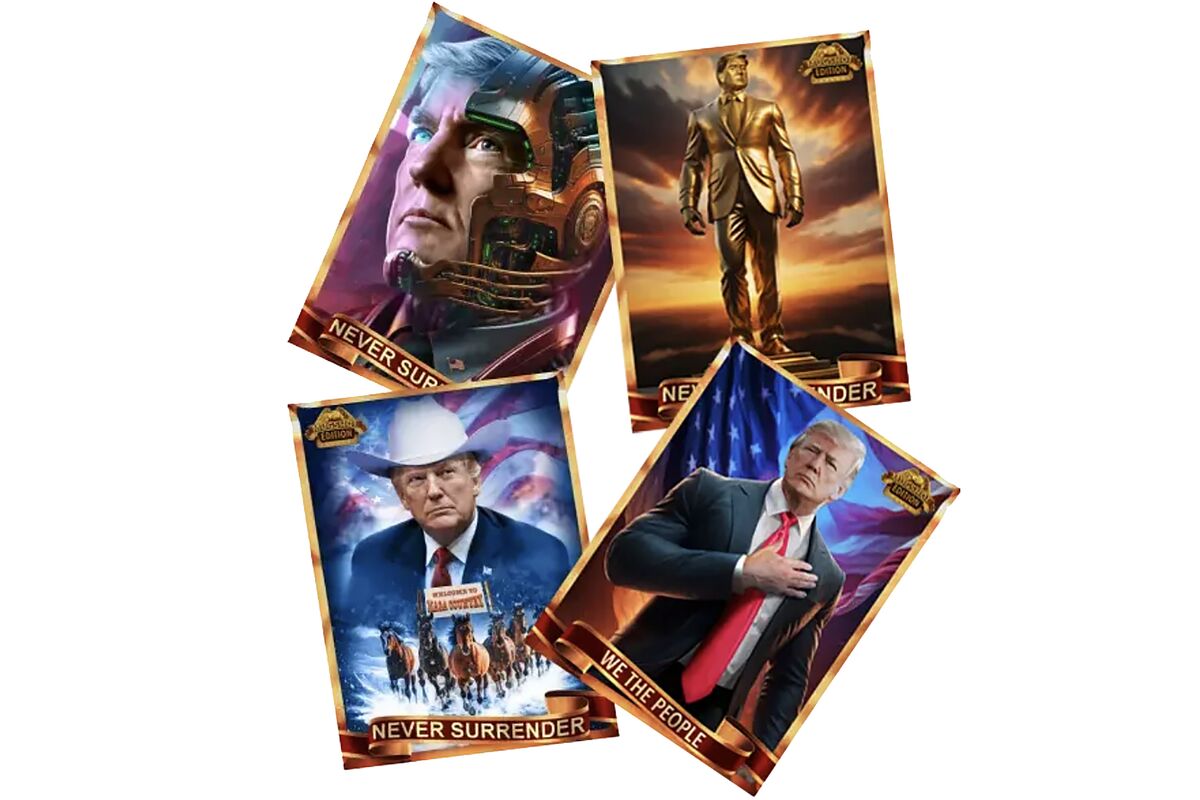
The digital card MugShot Edition is released, priced at $99 each. Source: collecttrumpcards.com
Trump was by no means a passive participant in this project. "He approved every photo," Zanker said. "He spent hours creating them. He liked it and called it pop art," Zanker added, saying that this project led Trump to spend time studying cryptocurrency, asking many questions, and helping him understand how the Ethereum blockchain works.
According to Zanker, the NFTs were a huge success, with each new series selling out within hours. Subsequently, Trump held two events at Mar-a-Lago, one at the end of last year and another in May this year, where he met with NFT buyers. Zanker said, "He fell in love with these people: young, ambitious, unregulated. Someone asked him, 'What do you think of cryptocurrency?' He said, 'I like it, I don't want it all to flow overseas.' The crowd went crazy."
Once, when the topic of accepting campaign donations in the form of cryptocurrency was being discussed, Trump called his friend on stage, "Zanker, should we accept cryptocurrency donations?" Zanker recalled, "I said yes. And so, he became the cryptocurrency president." So far, Trump's campaign team has stated that they have raised over $4 million in cryptocurrency donations and have also raised millions of dollars in donations from industry supporters. According to Zanker, the Trump card NFTs (nearly 200,000 in total, divided into three series) brought in over $20 million in revenue for Trump and his partners, but he refused to disclose how this revenue was distributed. Trump's campaign team did not provide further comments on this.
After the NFT event, industry support for Trump and his efforts to attract potential donors in the cryptocurrency industry continued to heat up.
The next major event was in June at the tea room at Mar-a-Lago, where Trump and his guests were eating cookies. The event attracted a small group of executives from cryptocurrency mining companies.
"We discussed how to get Bitcoin users involved in the political process," said Brian Morgenstern, head of public policy at Riot Platforms Inc., who worked at the White House and Treasury Department during the Trump administration. "If you're not involved, if you're not talking to candidates, you can't change policy."
Trump was certainly involved. At the meeting with mining companies, he became a fervent "cheerleader" for cryptocurrency and posted on his Truth Social account, expressing his hope that all remaining Bitcoin would be "made in America!!!" and stating that Bitcoin mining might be "our last line of defense against CBDCs (central bank digital currencies)." Critics of CBDCs warn that they could be used as surveillance tools, as they make it easier for government authorities to track the flow of funds. Of course, they also pose fierce competition for dollar-pegged stablecoins.
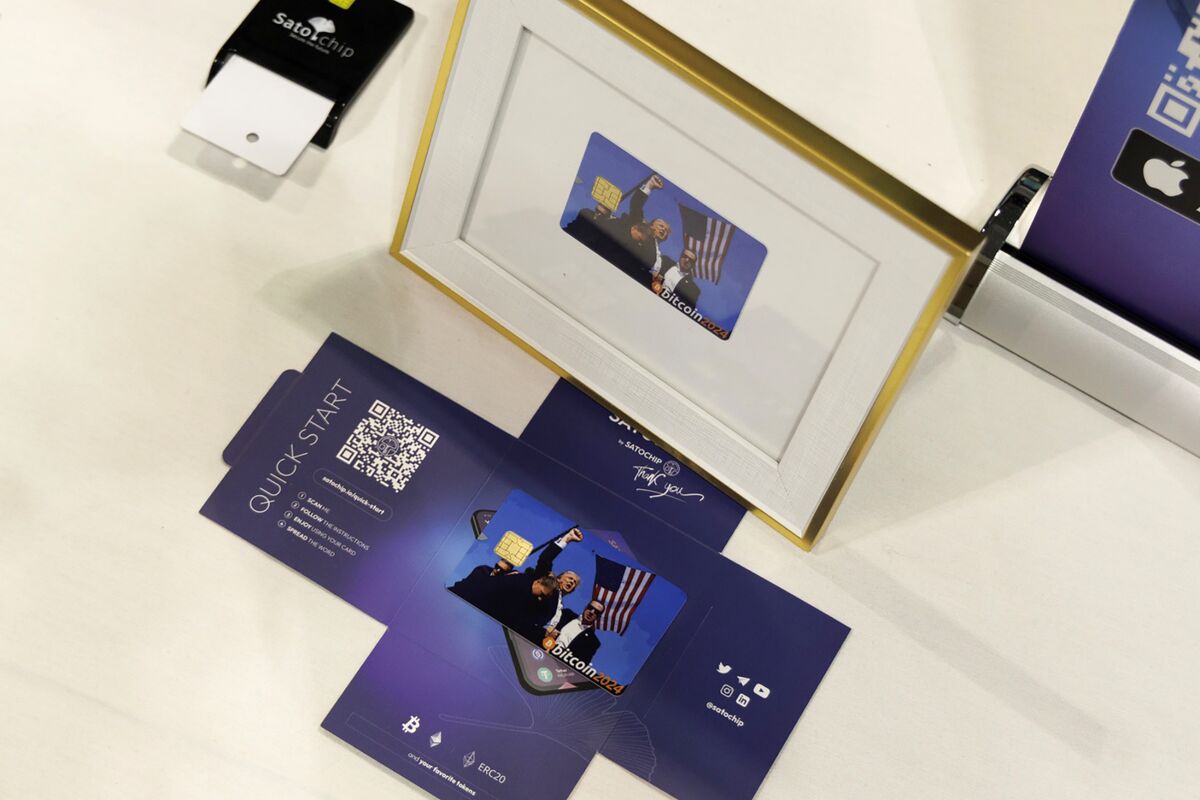
Satochip crypto wallet displayed at the Bitcoin 2024 conference, featuring photos taken after Trump's assassination attempt. Photographer: Brett Carlsen/Bloomberg
Trump's circle of cryptocurrency advisors has expanded. Billionaire Elon Musk often advises the cryptocurrency industry. Vivek Ramaswamy, Trump's former opponent in the Republican primaries and an entrepreneur, also stated that he had discussed potential cryptocurrency policies with Trump.
In Congress, he has found cryptocurrency believers among his Republican allies. Senator Bill Hagerty of Tennessee attended the mining company meeting at Mar-a-Lago in June and the Bitcoin conference in Nashville, and has become Trump's agent on cryptocurrency issues.
Earlier this month, the cryptocurrency industry took center stage at the Republican National Convention in Milwaukee. Wisconsin Congressman Bryan Steil participated in a discussion on cryptocurrency at the blockchain conference, while Hagerty spoke for the industry in a panel discussion on manufacturing.
Hagerty said, "We need to reset the boundaries of the bureaucratic agencies in Washington, and what we're seeing is agencies overstepping their bounds, creating uncertainty, and that uncertainty has a very negative impact on capital investment."
Outside the security perimeter of the Republican National Committee, supporters distributed paper fans promoting MAGA memecoin, a cryptocurrency project that has recruited Trump ally Roger Stone as a partner. Trump has become a focal point for memecoin traders, and MAGA is the largest memecoin related to Trump, with a total market value of over $300 million, according to CoinGecko. These tokens have no official connection to Trump, but that hasn't stopped them from becoming popular. The Pump.fun team at the memecoin platform noted that over 2,000 tokens related to Trump were created just after the shooting incident on July 13.
Of course, there is political risk in Trump's close association with this notorious asset class, especially if a situation similar to FTX were to occur again, or if market sentiment worsens due to price declines. However, Hilary Allen, a professor at the Washington College of Law specializing in financial law, stated that the ideological alignment of the cryptocurrency industry with the Republican Party may pose an even greater risk.
"Given that cryptocurrency itself is a very ideological investment, this may alienate some users," she said. "This may increase the appeal to Republican users, but on the other hand, it may alienate Democratic users."
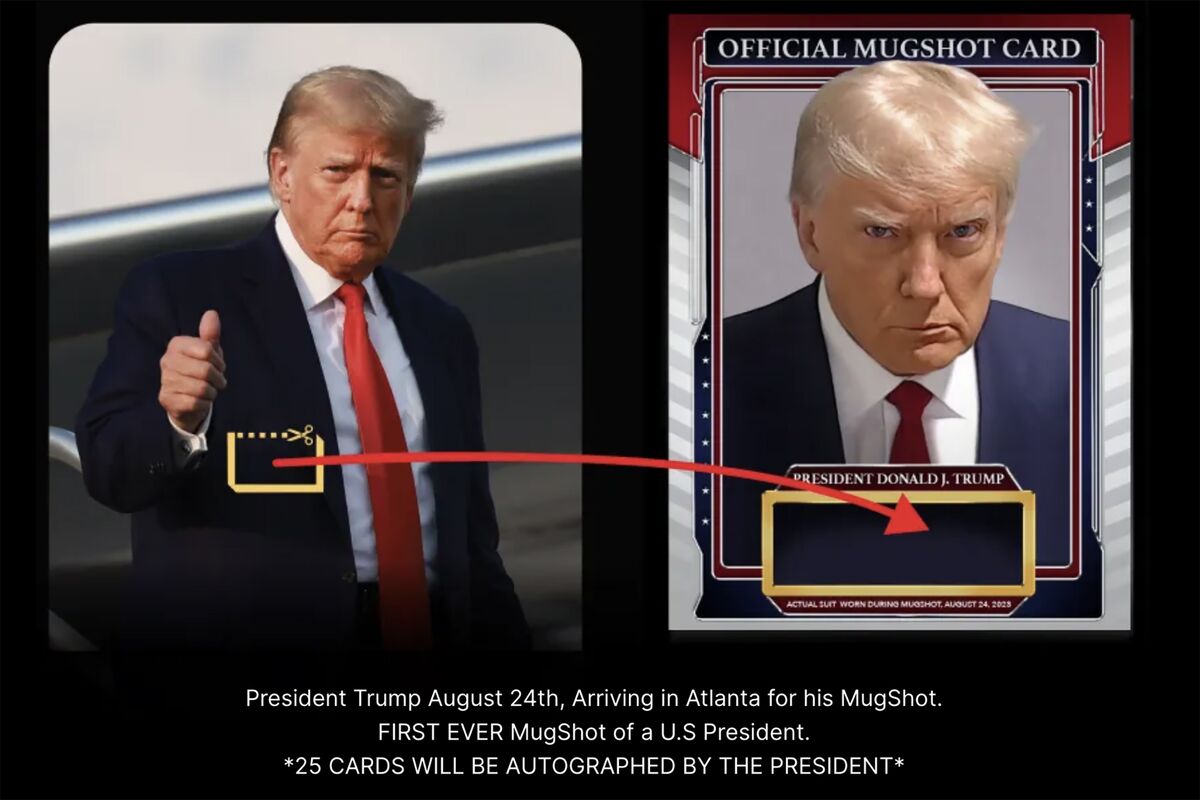
The Trump trading card website promotes real-world benefits of NFT purchases, including a physical trading card with a fragment of the suit he was wearing when he was arrested in Fulton County, Georgia on August 24, 2023. Source: collecttrumpcards.com
Only time will tell if Trump will win his second term and bring about a more favorable regulatory environment for the cryptocurrency industry. Currently, betting on Polymarket shows a 57% probability of Trump winning. Polymarket is a cryptocurrency-based platform that allows users outside the U.S. to bet on political outcomes.
Friendly regulatory agencies may not be the only gift of Trump's victory.
In Nashville, Trump stated that he would order the government not to sell the cryptocurrency seized in criminal cases, but to use it as the basis for a so-called strategic Bitcoin reserve. However, Bitcoin gave back its gains before the speech, as Trump did not confirm plans to order the government to purchase up to 1 million tokens, a message that his opponent Robert F. Kennedy Jr. said on Friday at the conference.
Meanwhile, even in the midst of a busy campaign schedule, Trump is planning the next steps for his cryptocurrency project.
The fourth set of Trump NFT series is in the works, and Zanker hopes it will be launched in August, promising that it will be the "best NFT series ever" and will "bring many surprises."
"We saw him before the shooting incident, asked him to review the artwork," Zanker said. "He looked at every photo."
免责声明:本文章仅代表作者个人观点,不代表本平台的立场和观点。本文章仅供信息分享,不构成对任何人的任何投资建议。用户与作者之间的任何争议,与本平台无关。如网页中刊载的文章或图片涉及侵权,请提供相关的权利证明和身份证明发送邮件到support@aicoin.com,本平台相关工作人员将会进行核查。



